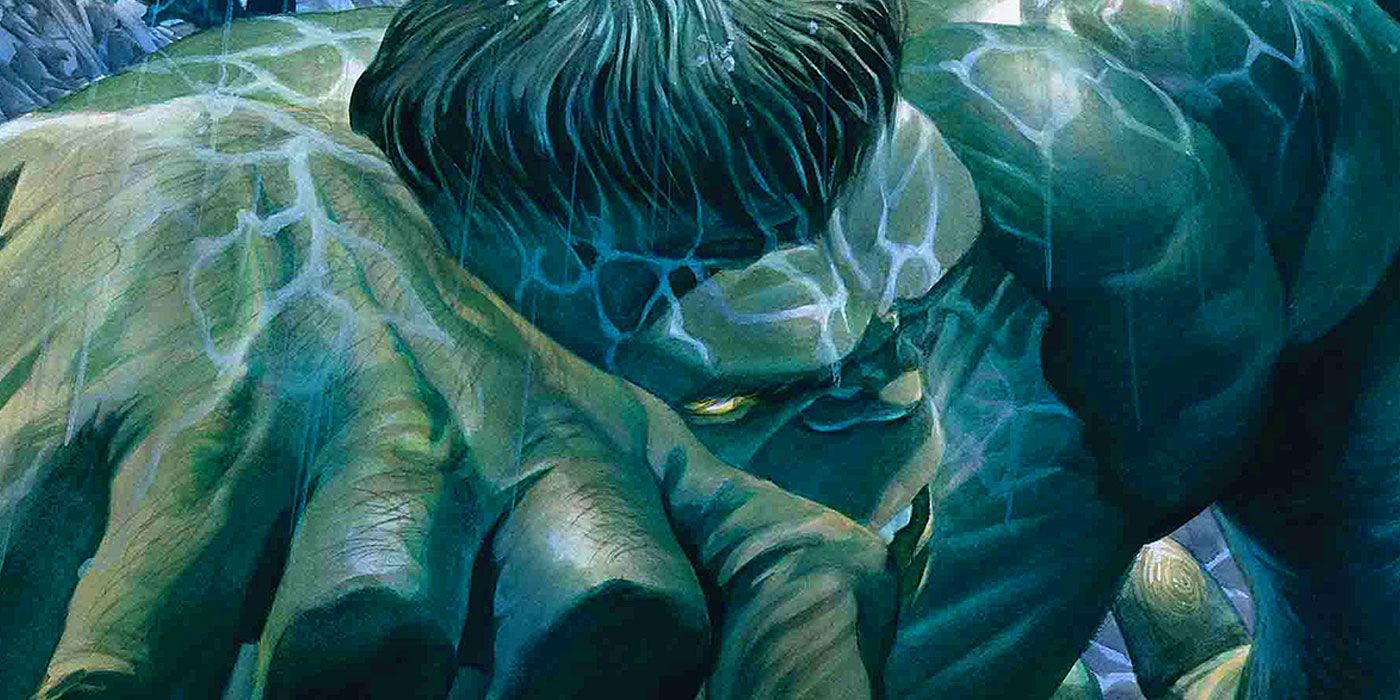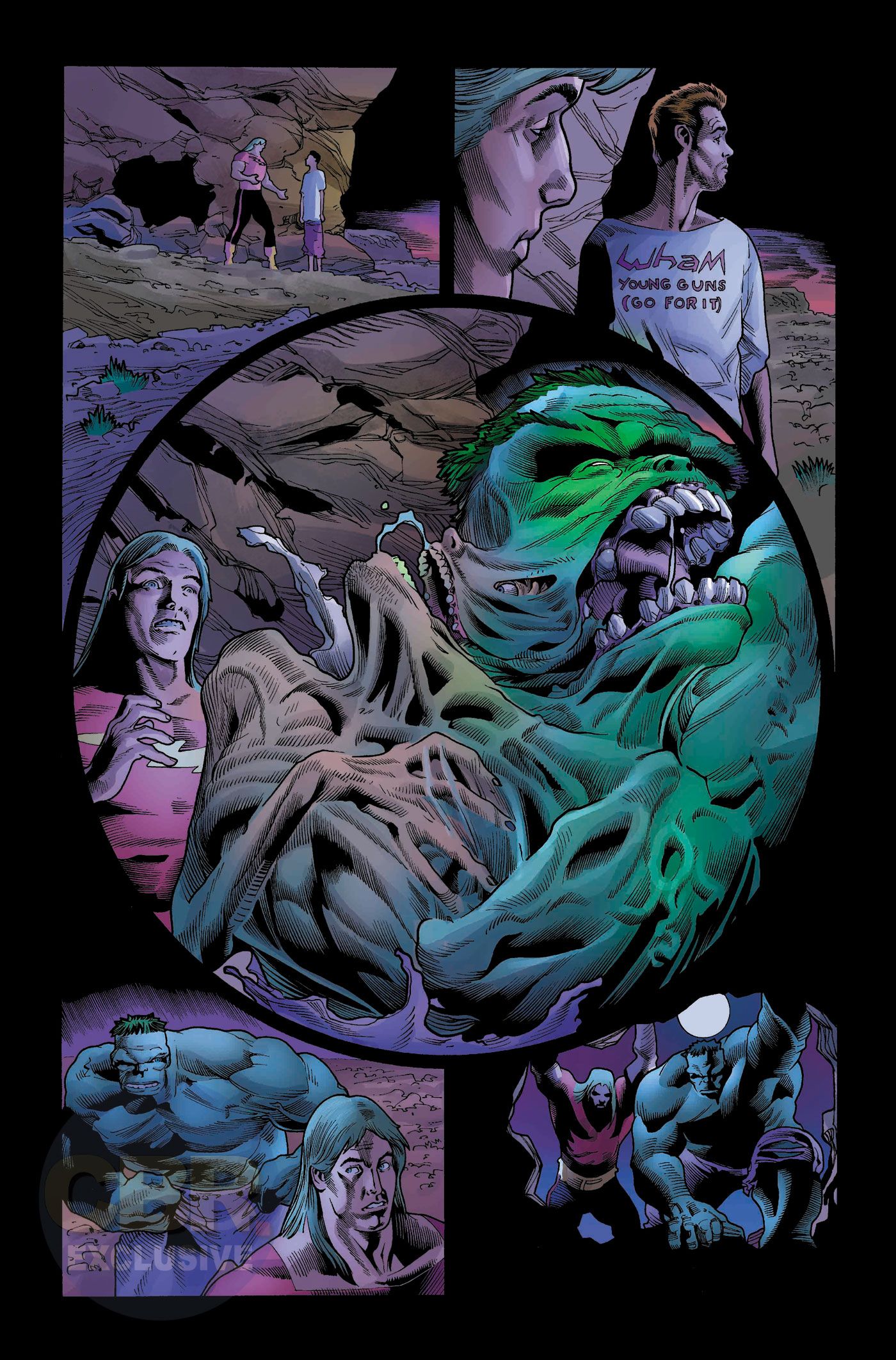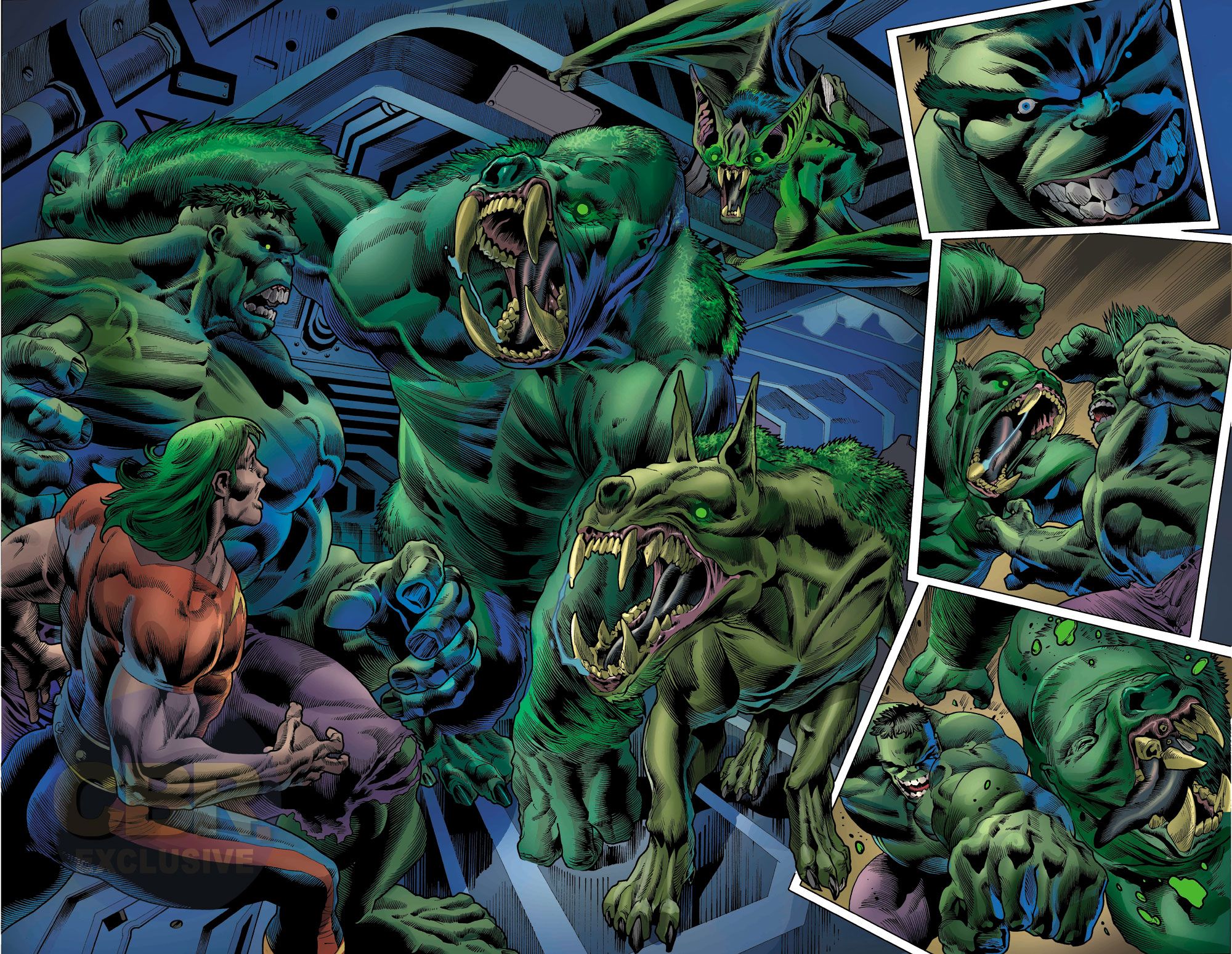In 2018's Immortal Hulk #1 Al Ewing and Joe Bennett introduced readers to a new incarnation of the titular Jade Giant -- one that's just as strong as previous emerald hued personas, but infinitely more dangerous.
This version of the Hulk possesses three things the others don't: Intelligence, cunning and a severely vicious streak. So far, the Hulk has primarily used these traits against the malevolent supernatural forces that may be behind the mysterious resurrections of the Marvel Universe's gamma-irradiated characters. He's also turned his rage against the clandestine government forces of Shadow Base, who have tried to kill and imprison him. The question that's been looming in the background of the series, though, is what would happen if the Immortal Hulk suddenly turned his attention to the institutions of the larger human world that have hounded him? What would he do?
Readers got a glimpse of exactly that in Immortal Hulk #15 where the title character told his gamma empowered former psychiatrist, Doc Samson, that he intended to end the world. But what exactly did the Hulk mean by that? And what role would Bruce Banner and Samson play in those plans? For the answers to those questions and more CBR spoke with Ewing about the dark drives and personal demons of his cast members.
CBR: In Immortal Hulk #15, your titular character opens up to Doc Samson about some of the things that drive him and the history of this particular persona. We learn that he is indeed rooted in the idea of the Devil Hulk from the Paul Jenkins and Ron Garney Hulk run. What made you want to go back and look at this aspect of Banner and the Hulk's psyche?
Al Ewing: I guess it sprang semi-organically out of thinking about who this Hulk was, and what his long-term goals might be. That and a lot of the theological imagery and iconography that started creeping into the book -- right from Avengers: No Surrender, really, which was when I first started thinking about that end of things, with that Jarvis speech that people liked. So I was thinking a lot about the Devil, and various conceptions of that figure, and the Hulk as representative of that darker side, the shadow side of ourselves.
The shadow isn't just the dark side, though -- it's things we don't like to admit to ourselves, uncomfortable truths we hide from. And while Bruce doesn't like to admit to his anger, sometimes anger is a justified and necessary response to the various injustices of a world that, to put it mildly, could be improved. So how would someone who felt completely outside of humanity express that anger? Would he be tactful about it? Probably not - and when that person has the raw power of the Hulk, that could get scary.
Anyway, when I did one of my regular research read-throughs and remembered the Paul Jenkins / Ron Garney Devil Hulk -- a Hulk Bruce represses completely, who he doesn't want to admit, who has "Devil" in the name, who wants to end the world -- that all clicked into place very easily. Suddenly, I had a good idea of who this new Hulk was -- or, at least, who he'd evolved from.
Also in that issue, the Hulk tells Samson he's here to end the world. Some people might read what he's laying out there as almost an MCU Thanos or Ras Al Ghul-style manifesto of killing countless people to save the rest. Samson seems skeptical and says he's just like any other Hulk. Can you talk at all about your intentions with and or interpretations of this scene?
This is actually kind of fascinating to me from a writing perspective, because obviously this is how citizens of the Marvel Universe are going to react to Hulk if he says any of this stuff in front of a TV camera. (Or to Jackie McGee. It'd make quite a front page.) He doesn't really know how to phrase things delicately or politically, so I can see how the automatic assumption might be that Hulk must be about to embark on some genocidal project.
But I think it's important to remember that the Hulk is a chaotic being -- he hates being told what to do, he bristles against any kind of structure, including the towns and cities he routinely destroys, and yes, the lives he ruins in doing so - but Bruce Banner isn't a killer. If we subscribe to the Amadeus Cho theory (Which I do -- it's comic book logic but it's a neat way to get around it), when Hulk goes on his rampages, the Banner side is trying to steer the runaway train, and succeeds enough to make sure there's an absolute minimum loss of life, usually zero. And while we have shown this new Hulk being a little more relaxed about that -- scarily so -- I still feel like there's a very long way to go before he's murdering billions of people as part of some master plan.
Although, having said that, I also don't want to come out and say it's completely impossible that the Hulk could do something monstrous, because I think that might defuse some of the tension inherent in this version of Hulk. I guess this comes back to my general struggle with the Internet and its tendency to impose interpretations on stories -- my intention was to have people read that and wonder and speculate and maybe worry about what the Hulk might be planning, not to say, "Well, the Hulk must obviously be planning THIS, because he thinks THIS!" and boil it down to one possibility, and kind of filter everything in the story through that. That's probably a recipe for disappointment, especially with this book. The central question is, "Is he man or monster, or is he both?" A certain level of ambiguity is always going to be part of it, and I like to make sure that ambiguity is in there.
I will say that nobody I've seen has guessed what the Hulk (or Banner) is really planning yet. So when it comes, it'll hopefully be a cool twist.
Oh, and as for Samson - he's going through a massive existential crisis, so he's not the greatest psychiatrist in the world right now. I think he's just glad Hulk might be thinking about someone besides himself.
CBR: Readers of Avengers: No Road Home might be viewing the Hulk's words in a whole different light based on his actions there. I know in the past you've said you want to keep the stories sort of separate as to not penalize people who are just interested in Immortal Hulk. But for readers of both, is there any connective tissue between what happens to the Hulk in No Road Home and what happens in his solo title?
Al Ewing: It was a very happy accident that they both came out on the same day! There is that shared mention across them of ending the human world, and in No Road Home he calls that "a good place to start.” I guess both the weekly Avengers series are significant to the Hulk's development. Part of my thinking on this is a response and evolution of the Hulk's position in No Surrender. Back then, he wanted to actively destroy the Earth to protect Banner from being hurt. He's definitely mellowed since then - but how much? Like I said, I like to keep things ambiguous until the time is right.
All that said, I will reiterate that if you're an Immortal Hulk reader, you absolutely do not need to read any comic that's not Immortal Hulk to get what's going on in Immortal Hulk. If you want the context of the shared universe, we try to guide you in the letters page of each issue. It's our compromise for the lack of editorial captions, since I feel that in a book with this particular tone, they'd bring the reader out of the story. But so far, there's never been a special event comic or tie-in series that you have to read to understand what's happening. I think that's one of the things that makes this book what it is, so we'll definitely try to continue that streak.
We also learn more about what happened to Doc Samson since his resurrection, and one thing that resonated with me is that Samson died a hero and came back in a relatively stable state of mind. That begs a question of the gamma empowered: Does how they died affect who they are when they come back? And what can you tell us about Samson's role in Immortal Hulk moving forward?
That's a really fascinating theory! I'm sure if someone mapped out all the deaths and resurrections of the major Gamma characters, there'd be something in that. Although I'm not a hundred percent convinced that Samson is stable. He's certainly much nicer and calmer than he was while Leader and M.O.D.O.K. were manipulating his mind, but he's also struggling with a massive existential crisis.
I thought it'd be interesting to have a character who came back from the dead and just couldn't process it at all. And Samson, having popped back into existence with no real fanfare or explanation - which is fair enough, it's comics, and it gave me something interesting to play with - was the ideal person to have that question of "why" haunting him. So we see him shutting himself off, trying to find answers in religion, being generally kind of distant and sarcastic. The fact that he's become the character who makes jokes in the face of all this doesn't seem all that healthy to me. Anyway, we've got some long-term plans for him -- there's a definite space for him in the evolving cast.
Check back soon for part two of our interview with Al Ewing, where we chat about the Immortal Hulk's other gamma powered friends and foes who have returned to the world of the living, and Ewing's long term plans for the series.




